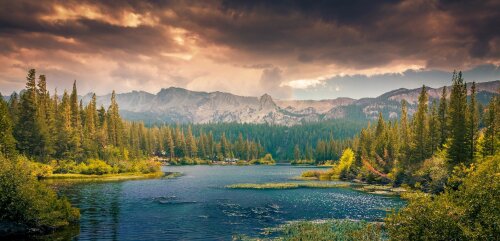Best Natural Resources Lawyers in 100 Mile House
Share your needs with us, get contacted by law firms.
Free. Takes 2 min.
List of the best lawyers in 100 Mile House, Canada
About Natural Resources Law in 100 Mile House, Canada
100 Mile House, located in the South Cariboo region of British Columbia, Canada, is a prime location rich in natural resources. The area is known for its abundant forests, water resources, and mineral deposits. These natural assets support various industries, including forestry, mining, agriculture, and tourism. Natural Resources Law in 100 Mile House primarily focuses on the regulation, conservation, and management of these resources to ensure sustainable development and environmental protection. This field of law addresses the balance between resource utilization and conservation efforts to benefit the community and the environment.
Why You May Need a Lawyer
There are several situations in which individuals or organizations might require legal assistance related to natural resources in 100 Mile House:
- Property Disputes: Conflicts over land use or resource extraction rights can arise, particularly where land ownership extends over areas rich in natural resources.
- Environmental Compliance: Ensuring adherence to environmental regulations when undertaking activities like logging, mining, or farming can require legal expertise.
- Resource Extraction Permits: Obtaining the necessary permits for activities such as mineral exploration or timber harvesting can be complex and may require legal navigation.
- First Nations Rights: Legal guidance may be necessary to deal with indigenous land rights and resource management, as First Nations play a crucial role in the stewardship of natural resources.
- Regulatory Changes: Staying informed and compliant with changing laws and policies affecting natural resource use and conservation.
Local Laws Overview
Natural Resource laws in 100 Mile House are influenced by municipal, provincial, and federal regulations. Relevant local laws include:
- Forestry Regulations: Govern the sustainable management and harvesting of forest resources, ensuring sustainable forestry practices and reforestation.
- Mining Act: Sets the rules and requirements for mineral exploration, development, and reclamation processes.
- Water Protection Act: Focuses on the management and conservation of water resources, including usage rights and water quality standards.
- Environmental Protection Legislation: Encompasses laws related to pollution control, habitat conservation, and environmental impact assessments.
Frequently Asked Questions
What types of natural resources are prominent in 100 Mile House?
The area is rich in forests, minerals, and water resources, supporting industries like forestry, mining, agriculture, and tourism.
How does Natural Resources Law affect local landowners?
Landowners must navigate laws related to land use, resource extraction rights, and environmental regulations to use their property for resource development.
What environmental regulations should I be aware of?
Key regulations involve sustainable resource management practices, pollution control, wildlife conservation, and water usage restrictions.
Are permits required for resource extraction?
Yes, activities like logging, mining, or large-scale agriculture often require permits to ensure compliance with environmental and land use laws.
How do indigenous land rights impact natural resources law?
Indigenous communities have rights to manage certain land areas and resources, which must be considered in natural resources management and development projects.
What are the consequences of non-compliance with natural resources law?
Non-compliance can result in fines, legal actions, and suspension of resource extraction permits or business operations.
How do I resolve a property dispute related to natural resources?
Legal advice should be sought to understand rights, evidence, and possible resolutions based on property and resource laws.
What should businesses in natural resource industries be aware of?
Businesses must remain compliant with regulatory regimes and stay updated on policy changes affecting resource management and environmental stewardship.
Who enforces natural resources law in the region?
Various governmental bodies, including municipal governments, British Columbia provincial agencies, and federal organizations, enforce natural resources laws.
Can I extract minerals from my property?
Mineral rights often require specific ownership and legal arrangements. Legal consultation can determine what is permissible on your property.
Additional Resources
Helpful resources for legal advice and information include:
- Local law firms specializing in environmental and natural resources law
- British Columbia Ministry of Forests
- Indigenous Services Canada
- Environmental Protection Branch of British Columbia
- Cariboo Regional District office for local land and environmental queries
Next Steps
If you need legal assistance in natural resources, consider taking these steps:
- Identify Your Needs: Clearly define the legal issue or information you need.
- Consult a Lawyer: Reach out to law firms in 100 Mile House with expertise in natural resources law.
- Gather Documentation: Collect relevant documents such as land titles, permits, and any correspondence related to your issue.
- Explore Government Programs: Contact governmental agencies for additional information or support regarding regulations and permits.
Lawzana helps you find the best lawyers and law firms in 100 Mile House through a curated and pre-screened list of qualified legal professionals. Our platform offers rankings and detailed profiles of attorneys and law firms, allowing you to compare based on practice areas, including Natural Resources, experience, and client feedback.
Each profile includes a description of the firm's areas of practice, client reviews, team members and partners, year of establishment, spoken languages, office locations, contact information, social media presence, and any published articles or resources. Most firms on our platform speak English and are experienced in both local and international legal matters.
Get a quote from top-rated law firms in 100 Mile House, Canada — quickly, securely, and without unnecessary hassle.
Disclaimer:
The information provided on this page is for general informational purposes only and does not constitute legal advice. While we strive to ensure the accuracy and relevance of the content, legal information may change over time, and interpretations of the law can vary. You should always consult with a qualified legal professional for advice specific to your situation.
We disclaim all liability for actions taken or not taken based on the content of this page. If you believe any information is incorrect or outdated, please contact us, and we will review and update it where appropriate.








